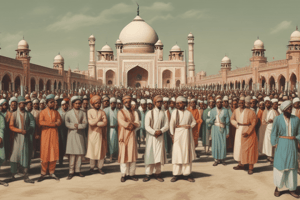Podcast
Questions and Answers
What was the primary focus of Sir Syed Ahmad Khan's 'Causes of the Indian Mutiny'?
What was the primary focus of Sir Syed Ahmad Khan's 'Causes of the Indian Mutiny'?
- The reasons for the Muslim plight during the British rule (correct)
- The role of Hindus in the 1857 mutiny
- The Christian missionary influence on Indian politics
- The impact of industrialization on Indian society
What was the catalyst for the Indian Muslim renaissance that led to the birth of Pakistan?
What was the catalyst for the Indian Muslim renaissance that led to the birth of Pakistan?
- The failure of the 1857 struggle for independence (correct)
- The rise of Christian missionary influence in India
- The success of the 1857 struggle for independence
- The industrialization of India during the British rule
What was the consequence of Hindus siding with the English during the 1857 struggle?
What was the consequence of Hindus siding with the English during the 1857 struggle?
- Muslims faced property confiscation, job exclusion, and discrimination (correct)
- Muslims were favored in government positions and institutions
- The British colonizers left India voluntarily
- Hindus were excluded from government jobs
How did Hindus initially respond to the 1857 struggle for independence?
How did Hindus initially respond to the 1857 struggle for independence?
What was the outcome of Hindu support for the English during the 1857 struggle in terms of government positions and institutions?
What was the outcome of Hindu support for the English during the 1857 struggle in terms of government positions and institutions?
Flashcards are hidden until you start studying
Study Notes
The Spark of the Indian Muslim Renaissance
- The 1857 struggle for independence sparked the Indian Muslim renaissance, which ultimately led to the birth of Pakistan.
- Sir Syed Ahmad Khan's "Causes of the Indian Mutiny" identified the root causes of the Muslim plight.
Causes of the Muslim Plight
- English policies contributed to the Muslim plight.
- Christian missionary influence had a negative impact on Muslim welfare.
- Hindu moneylenders exploited Muslims, adding to their difficulties.
- Unemployment and industrial devastation further exacerbated the Muslim condition.
Hindu-Muslim Dynamics
- Initially, Hindus supported Muslims in the 1857 struggle for independence.
- However, Hindus later sided with the English, leading to severe repercussions for Muslims.
- Muslims faced harsh consequences, including property confiscation, job exclusion, and discrimination.
Hindu Favouritism
- Hindus were favored in government positions and institutions.
- This favouritism contributed to the Muslim sense of injustice and marginalization.
Studying That Suits You
Use AI to generate personalized quizzes and flashcards to suit your learning preferences.




